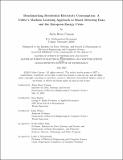Benchmarking Residential Electricity Consumption: A Utility’s Machine Learning Approach to Smart Metering Data and the European Energy Crisis
Author(s)
Canaan, Alexa Reese
DownloadThesis PDF (2.734Mb)
Advisor
Knittel, Chris
Wilson, Ashia
Terms of use
Metadata
Show full item recordAbstract
The European Energy Crisis is putting increasing pressure on the global energy supply and the residential sector is a key sector with variable consumption patterns that accounts for 40% of global energy consumption and residential buildings accounting for 27% of global energy consumption [32]. We use utility smart metering data at the hourly energy consumption level and daily peak consumption level from a subset of Iberdrola’s Spanish residential customers. Critically, we develop a model for utilities hoping to analyze smart metering data effectively. We test several different clustering methods and analyze energy consumption at different levels of granularity to identify the best benchmarking practices at all levels. We hypothesize that time, weather, and household characteristics are significant factors to identify energy consumption for a household and that outlier observations of energy consumption highlight opportunities to conserve more energy, a novel approach, critically not using any personal identifiable information. We also perform residual analysis to identify households that are most sensitive to changes in temperature. This creates a strong foundation for demand-response with customers. As Europe heads towards a long-term energy crisis, it is crucial that utilities have a framework to follow for their analysis before performing interventions with customers. Further potential uses for this methodology at the governmental, utility, and local/individual levels are also included at the end to motivate potential case studies.
Date issued
2023-06Department
Massachusetts Institute of Technology. Department of Electrical Engineering and Computer Science; Massachusetts Institute of Technology. Institute for Data, Systems, and Society; Technology and Policy ProgramPublisher
Massachusetts Institute of Technology